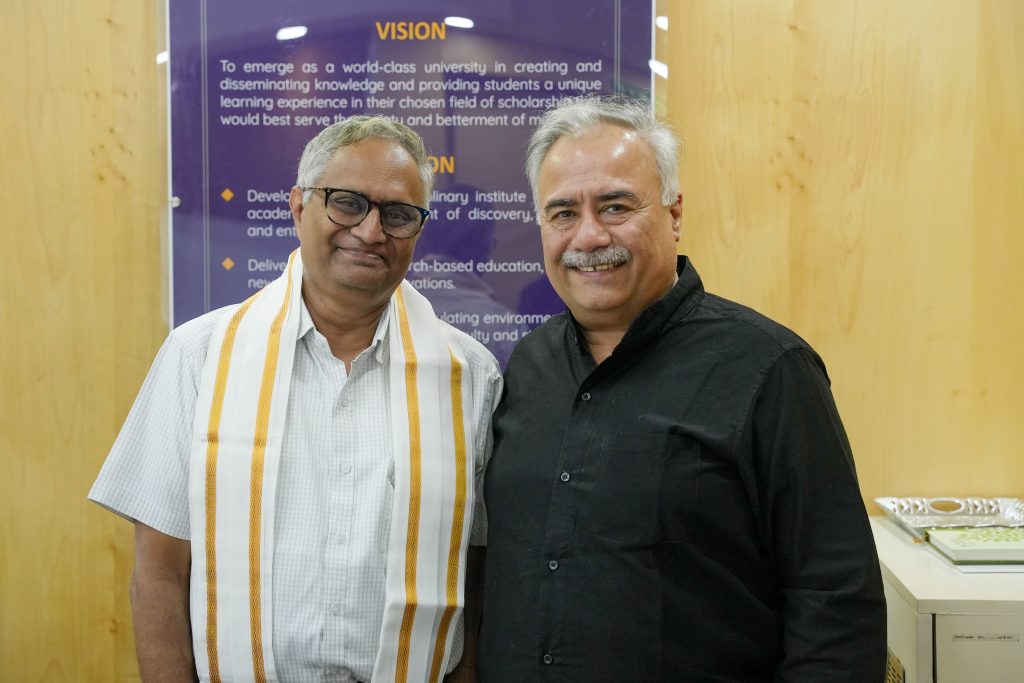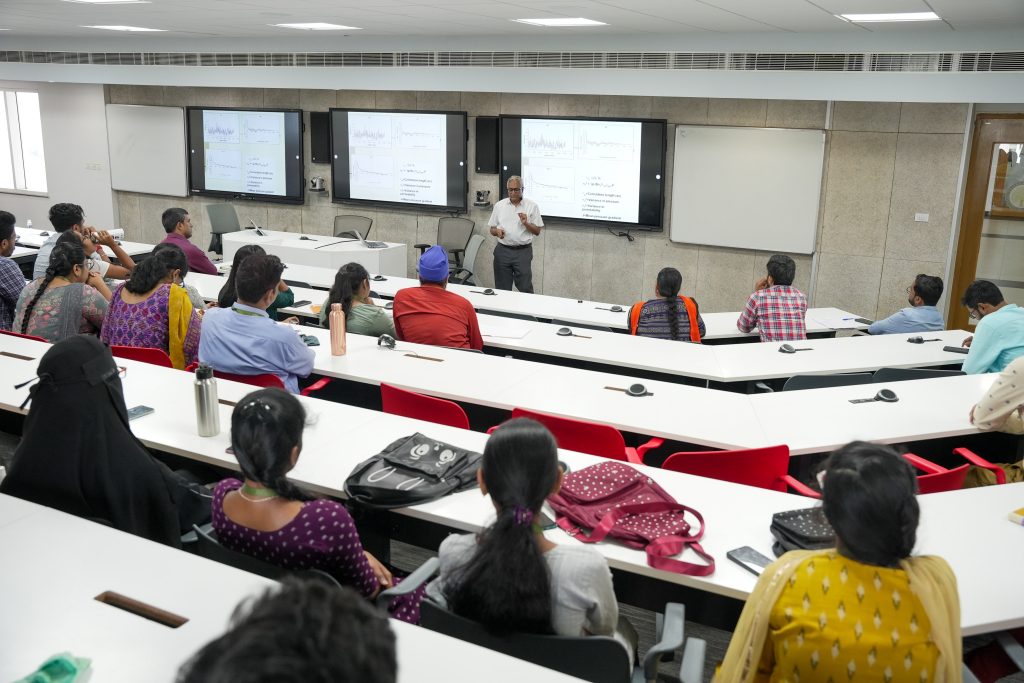Success Mantra for Managers Concludes with a Resounding Success
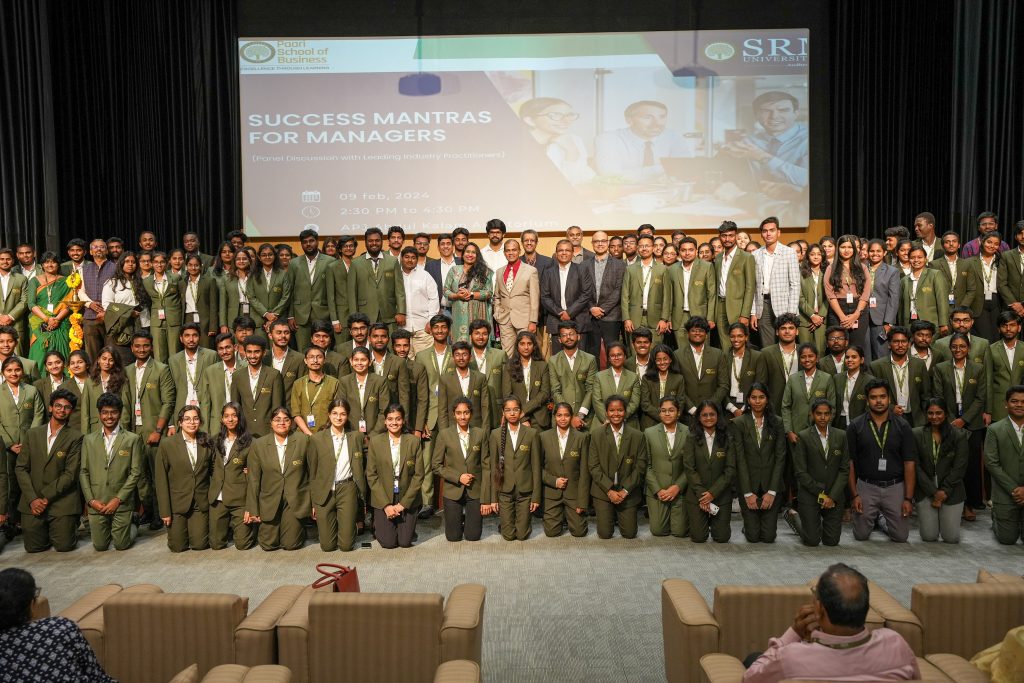
Paari School of Business, the management precinct of SRM University-AP, hosted a dynamic panel discussion titled “Success Mantras for Managers” with experienced entrepreneurs and industry experts. The four-member panel consisted of industry stalwarts from various fields of management and the keynote speaker, Mr Mukesh Jain, who is the CTO, VP & Global Head of People Analytics.
During the event, Prof. Bharadhwaj Sivakumaran, the Dean of the Paari School of Business, explained the purpose and significance of the event. He highlighted that the panelists had gained practical experience by failing and bouncing back, as well as observing and learning from people throughout their careers, and could provide insights on what it takes to succeed in the corporate world. Mr Mukesh Jain, the keynote speaker, shared his wisdom and motivation during the event. He stated, “the key skill one needs to possess as an entrepreneur is to have a good understanding of how things work”.
The panel discussion that followed Mr Jain’s speech was moderated by Mr Sidharth Shankar Tripathy, a Harvard alumnus and the present Director of Entrepreneurship and Innovation at SRM University-AP. The discussion was insightful and inspiring as Mr Tripathy posed thought-provoking questions to the panel members.
Mr Tripathy started the discussion with a stimulating idea, stating that a mantra is a successful formula that has the power to transform. He questioned the panel members about the criticality of the idea of corporate athleticism and received an astounding response from Mr Nayanjyoti Goswami, Managing Director, Finance Operations & Strategy, State Street, who stated that it is often less about degrees and more about one’s attitude to work.
Mr Satish Rajarathnam, Head of People & Administration, RCG Global Services emphasised the need for collaboration and networking as a leader. He also highlighted the importance of functional knowledge, communication, networking and marketing skills. Ms Jyothsana Kuchimanchi, Senior Director- United Health Group, explained that change is an integral part of a manager’s life, and a manager should always be ready to adapt and upskill oneself to cope with changes.
Mr Anandan Jayaraman, COO FCC, Society Generale Global Solution Centre discussed the need for a manager to empathise with the customer and team members by putting himself in their shoes. The dynamic members of the panel cited the importance of self-learning and self-training, which can motivate team members, suggesting that a leader is a reader and should always update and upskill himself.
The panel discussion was an absolute game-changer. The insights shared by the speakers were incredibly valuable and contributed to the student’s understanding of what it takes to be a successful manager.
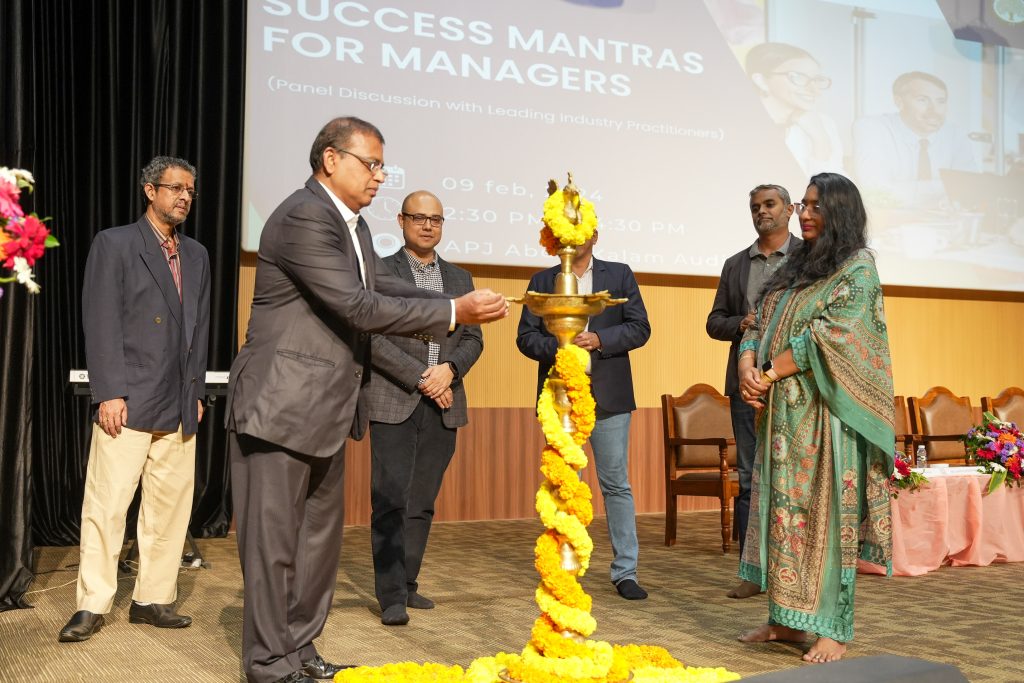
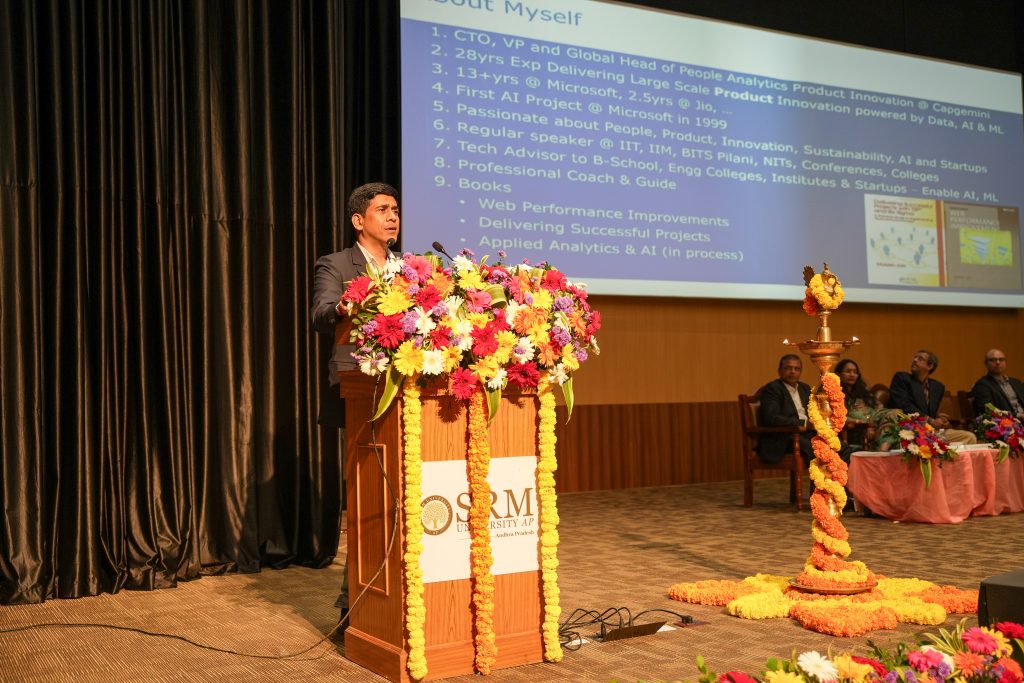
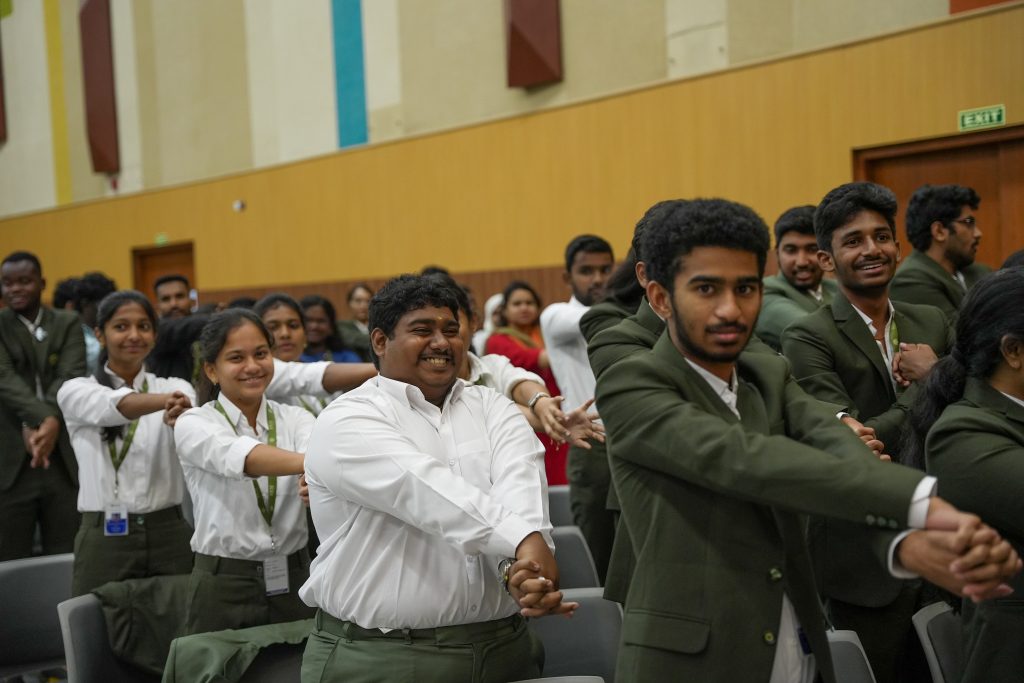
- Published in Departmental News, News, Paari Current Happenings, paari-events
Dr Dhamodharan Invited for Workshop on Youth Leadership
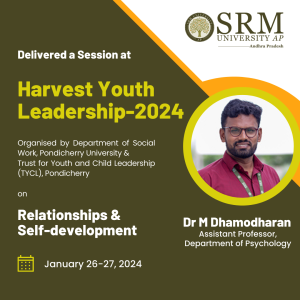 Dr M Dhamodharan, Assistant Professor in the Department of Psychology, was invited as a resource person to deliver a session on “Relationship and Self Development “from January 26-27, 2024, at the Two Days workshop on “Harvesting Youth Leadership-2024.”The workshop was organised by the Department of Social Work at Pondicherry Central University in collaboration with the Trust for Youth and Child Leadership (TYCL), Pondicherry.
Dr M Dhamodharan, Assistant Professor in the Department of Psychology, was invited as a resource person to deliver a session on “Relationship and Self Development “from January 26-27, 2024, at the Two Days workshop on “Harvesting Youth Leadership-2024.”The workshop was organised by the Department of Social Work at Pondicherry Central University in collaboration with the Trust for Youth and Child Leadership (TYCL), Pondicherry.
Dr Dhamodharan’s expertise and insights on the topic added value to the workshop, which aimed to empower young individuals and cultivate leadership skills among the youth. The session provided a platform for participants to delve into the dynamics of relationships and personal growth, essential aspects for nurturing effective leadership qualities.
His contribution towards the event underscored the importance of understanding the link between relationships and self-development in the context of youth leadership.
Abstract
Relationship is a continuing and often committed association between two or more people, as in a family, friendship, marriage, partnership, or other interpersonal links in which the participants influence each other’s thoughts, feelings, and actions (APA,2020).
The connections we set up, the several types of love we meet, and the effects these interactions have on our personal development all have a significant impact on how we live as people. Understanding the many kinds of relationships that exist is the first step in any analysis of relationships.
Every sort of relationship, whether it be sexual or platonic, professional or familial, has its own dynamics, obstacles, and expectations. In the context of human relationships, love manifests as a complex and profound energy. Love affects the core of who we are and transcends cultural barriers in all its manifestations. Numerous love typologies have been proved by academics and psychologists to classify and understand these types. Love has many sides, ranging from the Greek concepts of Agape, Eros, and Philia to contemporary psychiatric theories. This investigation looks at the subtle differences between various kinds of love, emphasising the behavioural, cognitive, and emotional aspects of each.
A foundational work in the field of psychology, Sternberg’s Triangular Theory of Love is at the core of understanding love. According to this theory, love can be viewed as a triangle made up of three essential elements: commitment, passion, and intimacy. It explores the significance of each ingredient and how they interact to shape the different manifestations of love through a thorough investigation of Sternberg’s theory. The talk explains the practical applications, providing a window into how the theory may be used to understand and negotiate the intricacies of real-world interactions.
Furthermore, a comprehensive knowledge of the human experience requires the inclusion of self-development in the conversation about love and relationships. In all their manifestations, relationships function as mirrors that reflect our advantages, disadvantages, and potential growth areas. The reciprocal effects of relationships, love kinds, and self-development are particularly important in human life. Also explains. how people change because of their relationships, moulding and honing their identities to fit the demands of romantic relationships and close relationships.
Finally, this session might give light on the complex interactions that exist between self-development, Sternberg’s Triangular Theory, love categories, and relationship types. Participants may understand more about the complex interplay between love and personal development as well as the enormous impact that connections have on forming our identities by exploring these interconnected domains. This talk might give insightful guidance for the participants to navigating the intricate web of interpersonal interactions, supplying a road map for cultivating meaningful connections and promoting comprehensive self-development.
- Published in Departmental News, News, Psychology News
Exploring Potential Collaboration with SUNY ESF
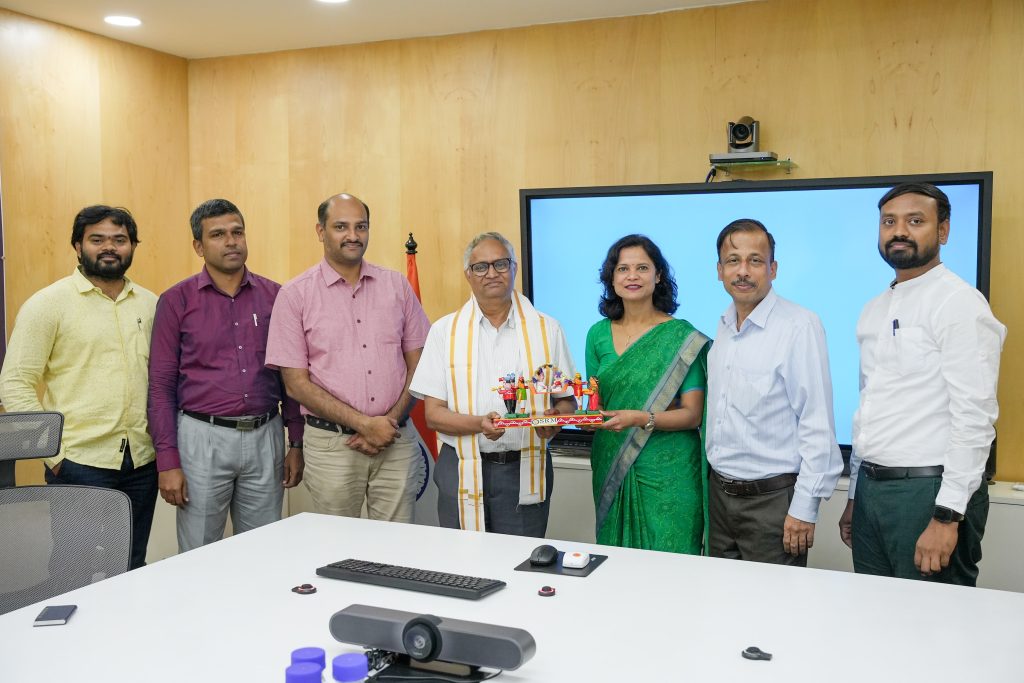
Prof. Bandaru Ramarao, who currently serves as the Chair of Chemical Engineering at SUNY College of Environmental Science and Forestry, visited SRM University-AP to explore potential collaborations between the two prestigious institutions.
During his visit, Prof. Ramarao conducted an engaging session with the Vice Chancellor, Prof. Manoj K Arora; Director of International Relations and Higher Studies (IR&HS), Ms Aditi Jain; and senior members of the faculty where they discussed various opportunities for collaboration, including the possibility of establishing an association for Masters and Ph.D. students, faculty and student exchange programmes, and scholarship collaborations for faculty members. Dr Jayaseelan Murugaiyan, Associate Dean in-charge of Sciences, proposed that the varsity could opt for a co-guide system between SUNY ESF and SRM AP.
Prof. Ramarao also delivered a seminar focused on “Techniques for Analysis of Transport Processes in Fibrous and Porous Media,” which was attended by enthusiastic masters and research scholars from the Department of Environmental Science and Engineering. The session was highly informative and provided valuable insights into the techniques used for analysing transport processes in fibrous and porous media. The event concluded with an interactive Q&A session. A token of appreciation was presented to Prof. Ramarao, culminating the visit into a huge success and paving the way for fruitful collaborations between the two institutions in the future.
A Study on Sustainable Organisational Development in the IoT Era
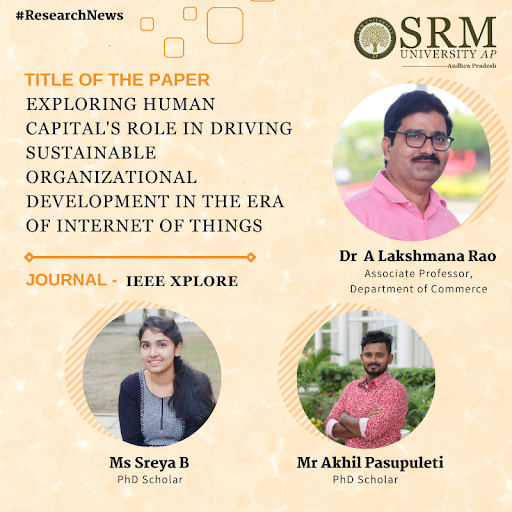 Human capital plays a crucial role in shaping an organisation’s growth in today’s digital age. It’s the idea generated by the human capital that leads to innovation. Dr A Lakshmana Rao, Associate Professor, Department of Commerce, along with his research scholars Ms Sreya B and Mr Akhil Pasupuleti, conducted a comprehensive study on human resource management in the information technology sector of Kerala. Their research paper titled “Exploring Human Capital’s Role in Driving Sustainable Organisational Development in the Era of Internet of Things” focuses on 320 participants from Kochi Infopark and investigates the impact of the Internet of Things (IoT) on their lives.
Human capital plays a crucial role in shaping an organisation’s growth in today’s digital age. It’s the idea generated by the human capital that leads to innovation. Dr A Lakshmana Rao, Associate Professor, Department of Commerce, along with his research scholars Ms Sreya B and Mr Akhil Pasupuleti, conducted a comprehensive study on human resource management in the information technology sector of Kerala. Their research paper titled “Exploring Human Capital’s Role in Driving Sustainable Organisational Development in the Era of Internet of Things” focuses on 320 participants from Kochi Infopark and investigates the impact of the Internet of Things (IoT) on their lives.
Abstract
The Internet of Things (IoT), a network of interconnected devices and sensors linked through the Internet, facilitates the connection between individuals, their devices, and vast amounts of data. Within companies, the human resources department plays a crucial role in managing the pressure generated by various aspects, including marketing, development, and the application of IoT in human resources. This study is motivated by the need to understand the potential of IoT in strategic human resource management practices. To explore the fundamental strategic human resource management practices and assess their mediating effects, this research gathered data from 320 respondents in the Kerala information technology sector, specifically Kochi Infopark, consisting of both lower-level executives and senior managers. The study utilises statistical analysis to examine the relationship between sustainable human resource practices, the Internet of Things, and sustainable human resource growth. Furthermore, the study highlights the IoT’s role as a mediator between strategic human resource management practices and factors contributing to sustainable HR growth, demonstrating a positive impact of independent variables on dependent variables. These findings emphasise the potential for organisations to enhance HR practices, decision-making, and innovation using IoT during crises and uncertainties. Integrating IoT with SHRM empowers organisations to effectively manage challenges and complex environments.
Practical Implementation
a) Employee Monitoring Systems: Implement IoT-enabled employee monitoring systems using sensors and wearable devices. This allows organisations to collect data on employee activities, health, and work environments. Analysing this data helps identify patterns, optimise resource allocation, and enhance overall employee well-being.
b) Talent Management Solutions: Utilise IoT devices to gather data on employee skills, competencies, and training needs. This information is valuable for developing personalised training programs, creating career paths, and strategising succession plans. Integrating IoT into talent management aligns HR practices with evolving workforce needs, leading to improved satisfaction and retention.
c) Remote Work Solutions: In times of crisis, such as the COVID-19 pandemic, leverage IoT-enabled remote work solutions. These solutions facilitate seamless communication, collaboration, and virtual team management. Integrating IoT with HR practices enables organisations to effectively manage remote workforces, maintain employee engagement, and adapt to challenging circumstances.
Social Implications
a) Improved HR Practices: Integrating IoT with HR practices enhances decision-making and fosters innovation. This, in turn, contributes to improved HR practices, ensuring that organisations are equipped to address contemporary challenges and complexities.
b) Employee Well-being: The use of IoT in employee monitoring systems promotes a holistic approach to employee well-being. Organisations can proactively address health and safety concerns, leading to a healthier and more engaged workforce.
c) Skill Development and Career Growth: IoT-driven talent management solutions contribute to individual skill development and career growth. Employees benefit from personalised training programs, creating a positive impact on professional development.
d) Crisis Adaptability: The integration of IoT in remote work solutions demonstrates organisational adaptability during crises. This not only ensures business continuity but also highlights a commitment to employee welfare in challenging situations.
e) Technological Advancement: Embracing IoT showcases an organisation’s commitment to technological advancement. This can enhance the organisation’s image, attracting top talent and positioning it as an industry leader.
Future Research Plans
In their upcoming research endeavours, the trio will focus on unlocking the bottlenecks of IoT-driven remote work dynamics and its influence on collaboration, productivity, and employee well-being in the post-pandemic context. They also plan on exploring the impact of interconnected devices on the moonlighting behaviours of employees and employment trends in IT firms and among professionals.
We wish the trio all success in their future endeavours.
- Published in Commerce Current Happenings, Departmental News, News, Research News


